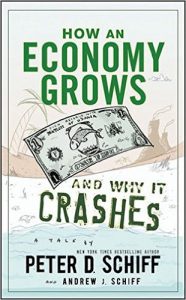 For the past few years, I’ve started thinking of basic economics through the prism of a thought experiment. This involves starting all analysis by considering twenty people sitting around on the savanna, each with literally nothing except his or her ability to work. This frame is highly instructive, because it allows the thinker to easily understand certain economics concepts, including, most importantly, that producing what others want is the only way to advance beyond subsistence. As Henry Hazlitt said, “The poor are poor not because something is withheld from them but because, for whatever reason, they are not producing enough.” This is as true for an entire modern society as it is for twenty people in the state of nature.
For the past few years, I’ve started thinking of basic economics through the prism of a thought experiment. This involves starting all analysis by considering twenty people sitting around on the savanna, each with literally nothing except his or her ability to work. This frame is highly instructive, because it allows the thinker to easily understand certain economics concepts, including, most importantly, that producing what others want is the only way to advance beyond subsistence. As Henry Hazlitt said, “The poor are poor not because something is withheld from them but because, for whatever reason, they are not producing enough.” This is as true for an entire modern society as it is for twenty people in the state of nature.
Peter Schiff’s How An Economy Grows is in the same vein as my thought experiment. This is why I bought it. But the book is not really the same thing—while it certainly explains basic economics clearly, it’s primarily meant as a polemic and a series of claims of how modern economists err, or at least how Keynesians err. I would have preferred a simple explanation of not only concepts that are relatively easy to understand, such as comparative advantage, but also of concepts that I find difficult to grasp (which is most economics concepts). Instead, I got what I take is basically simplified Austrian School economics. That, of itself, has some value. But the polemic overwhelms—everything is shown as totally simple and obvious, and any disagreement is cast as the specious mouthings of liars, frauds, and blackguards, and not even explained clearly. This sharply reduces the value of the book.
At the root of the book are two common beliefs, which I understand are associated with the Austrian School of economics—that fiat money is pernicious; and Say’s Law, in essence that supply creates demand, not vice versa. (This may not be an accurate statement about Austrian economics, about which I know little.) Neither of these is specifically mentioned; they just flow organically from the evolution of a thought experiment similar to mine, here beginning with three men on an island existing by subsistence fishing with hand nets. From this also flow other core principles of this book, including that deflation is not as bad as inflation and that government is almost always the creator of problems to the extent it performs functions beyond those of a night watchman state.
The book consists of a cleverly illustrated series of short chapters that relate the history of the island, each followed by a short direct lecture from the authors to readers. The economy grows through the productive efforts of its inhabitants, who by free exchange become richer and establish basic mechanisms like credit and banks, expanding into production and exchange of goods and services beyond fish. Government arises and is quickly captured by the stupid and grasping. The money supply is artificially increased (by the government manufacturing fake fish, which are the unit of currency, presumably meant as an argument for the gold standard). Politicians manipulate the economy to inflate the money supply, misallocate resources, and ultimately massively borrow real value (in the form of fish) from China (“Sinopia”) in exchange for the debased fiat currency, which they fear the Sinopians may one day want to redeem for actual value. A housing crisis ensues, caused by overvaluation of real estate due to government manipulation that misallocates resources from productive uses objectively valued to dubious uses that are politically favored. Ultimately, the economy all comes crashing down, when the Sinopians stop lending and the islanders are exposed as producing little of actual value and having no savings of value, and the islanders are reduced, once again, to fishing with hand nets.
I had hoped that this book would take my halting thought processes and advance them. But it didn’t. Yes, there is some useful basic economic information in here. But much of it is meant to be clever references to actual people in the modern world, reflected as barely disguised characters in the developing economy of the island. We are meant to see how obviously stupid these people are, because what they do in our world is supposedly the same as what they do in the island world. Maybe it is. But unless you know precisely what these people advocate in the modern world (say, for example, Ben Bernanke, Brent Barnacle in the book), and why they do so other than they’re stupid liars, the reader is left mostly in the dark as to what the parallel is and what is limitations are. And, as I say, this is polemic, rather than illumination. So this book has the limited use of explaining to children or the uneducated how a basic economy is created—but beyond the first half of the book, it is not worth much.
